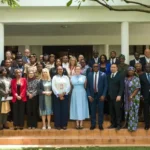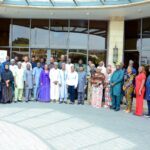By Chiazo Ogbolu/ Aisha Cole
The Nigerian Trawlers Owners Association (NITOA) has said that the menace of illegal, unreported and unregulated fishing had led to the depletion of fishing trawlers in the country .
Mrs Benedette Okonkwo, President of the association, said this at the Zoe Maritime Resources Ltd., Maritime Business Roundtable Breakfast Meeting (MBRBM), on fishing and fisheries in Lagos.
Okonkwo said that members of the association had a combined fleet of over 250 vessels and over 20 fishing companies.
This, she said, had drastically reduced to 150 vessels with about five presently struggling to survive.
She added that illegal fishing activities in the country was threatening Nigeria’s blue economy prospects.
Okonkwo called on the government to introduce initiatives that would boost the fishing industry.
“NITOA has been involved in industrial fishing activities in Nigeria since 1986 when some notable Nigerians initiated the idea of having a unified body to represent its members on issues of mutual interest.
“There is the need to establish Fisheries Terminal here in Lagos where about 95 per cent of the industrial fishing operators are based.
“Also, government should do well to resucitate the Export Expansion Grant (EEG) Scheme, to make it more robust, workable and transparent,” she said.
She said that trawler owners were overburdened by overzealous government agencies overseeing sea fishing.
This, she said, was affecting the growth of the industry that should be a veritable source of local fish supply and foreign exchange earnings for the country.
“There is the need for the government to sit down with NITOA to chart a common course so as to harmonise the processes and procedures to attract more local and foreign direct investments.
“ Other areas that government must look into include; high cost of statutory registration and renewals of trawlers particulars from the regulatory agencies; occasional pirate attacks at high sea leading to loss of lives and property and damage of vessels and machines,” she said.
Mrs Enitan Solarin, Director, YOA Insurance Brokers, stressed the need for insurance awareness to the fishing industry.
Solarin also called for enhanced collaboration between fisheries, regulators and insurance industry.
Solarin represented by Mrs Bolanle Anjorin added that enforcement by regulatory agencies with respect to insurances such as Protection & Indemnity, Hull & Machinery Third Party Liability-alm would improve the working conditions of fishers and fishing practices.
She pointed out that fishermen need financial incentives by government and other bodies and enforcement of regulations to curb illegal fishin in order to move the forward.
“As with all uncertainties, insurance plays an important role in the fishing sector as it provides financial compensation for unforeseen events.
“The Food and Agriculture Organisation (FAO), Code of Conduct for Responsible Fisheries, recognises the importance of insurance in fisheries.
“Its article 8.2.8 emphasises that owners or charterers of fishing vessels should carry sufficient insurance cover to protect the crew of such vessels and their interests, to indemnify third parties against loss or damage and to protect their own interests,” he said.
Also speaking, the Vice President of Fisheries Society of Nigeria, Dr Olalekan Oguntade, stressed the need for up-to-date data on IUU fishing to analyse the extent damage in the sector.
“On IUU Fishing, there should be a NEEDS assessment of the industry. We equally need to protect the artisanal fishing industry which is where most riverine communities operate,” he said.
In her welcome remarks, the Chairman, Zoe Maritime Resources Ltd., Mrs. Oritsematosan Edodo-Emore, said Nigeria’s vast coastline and its Exclusive Economic Zone (EEZ), had immeasurable fish resources which ordinarily should transform the economy if properly harnessed.
“It is on record that with a population of about 140 million local demand for fish outweighs the supply.
“This means that there is constant demand for fish and fish products which should keep the local fishing industry bouyant but the reality on ground tells a different story.
“The records show that there has been a steady decline in local catch and production of fish in Nigeria.
“In the 1970’s, domestic production of fish was said to range from 600,000 to 700,000 tonnes. By 1983 this dropped to 538,000 tonnes in 2000, local catch was 441,337 tonnes and today the figure is not encouraging,” she said.
Edodo-Emore said that the challenges of illegal, unreported and unregulated of fishing must be tackled for Nigeria to reap the gains of blue economy. (NAN)(www.nannews.ng)
============
Edited by Chinyere Joel-Nwokeoma











